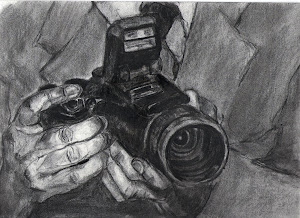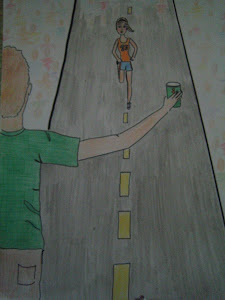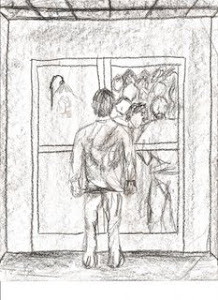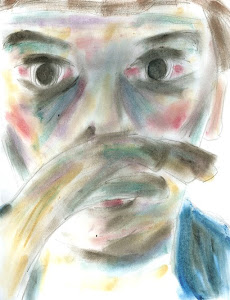Read the Poem "The Hound of Heaven" by Francis Thompson. Link http://www2.bc.edu/~anderso/sr/ft.html
In your opinion what is the essence of this poem? Explain it as best you can in no more then 3 sentences. If others have posted prior to you and you like or dislike what they said you can add an extra sentence or two (after you have put your own "authentic" interpretation in the post. Following this cite the three lines (together, or spread out) that you found to be most revealing in giving you this interpretation...or that still remain a puzzle to you (just pose this as a question on the blog).
Wednesday, August 29, 2007
The Hound of Heaven
Posted by
Tmart
at
5:47 AM
![]()
Labels: Poetry Response
Subscribe to:
Post Comments (Atom)







58 comments:
i feel the essence of this poem is about a man who lost his way, but found again. i also feel that this poem is very earthly which gave it a more serene feelings behind the story.
The heart of this poem is about taking sides. The narrator hates God; he hides from Him, fights with Him and he asks everyone else to do so too. When the narrator finally confronts God, who has followed him everywhere, he is enlightened with the knowledge that God has always been on his side.
“I tempted all His servitors, but to find/ My own betrayal in their constancy, / In faith to Him their fickleness to me, / Their traitorous trueness, and their loyal deceit.”
“ ‘Naught shelters thee, who wilt not shelter Me.’”
“All which I took from thee I did but take, / Not for thy harms, / But just that thou might’st seek it in My arms.”
This poem is about how people realize they are looking for God's love. But when they see this, they try to make excuses and seek to do other things with their lives. Unable to hide from God, the speaker must realize God is everywhere and he can find no peace without God.
"(For, though I knew His love Who followèd, Yet I was sore adread
Lest, having Him, I must have naught beside.)"
"Whom wilt thou find to love ignoble thee, Save Me, save only Me?"
"Float thy vague veil about me, lest He see!"
the essence of the poem is a man running away from the hound of heaven, which could be compared to a holy grim reeper. At first he does bad things, and the hound rejects him from the kingdom of heaven, but in the end the man stops running from the hound, but instead welcomes him into his arms, and he is accepted into the kingdom of heaven.
"I fled Him, down the nights and down the days;"
"I tempted all His servitors, but to find
My own betrayal in their constancy,"
"All which thy child's mistake
Fancies as lost, I have stored for thee at home:
Rise, clasp My hand, and come."
I agree with Madeline that the essence of this poem is a man who is rejecting God's love. Throughout the poem, though, he realizes that he cannot run from someone (or something) that is all around him. The author stresses the importance of seeing God in all things and accepting God's unconditional love. In the final lines, the narrator submits to the reality that God will always be his final destination.
"In faith to Him their fickleness to me, / Their traitorous trueness, and their loyal deceit. "
"Fear wist not to evade as Love wist to pursue."
The poem is about a man who has been running from God for a long time. At the end of the poem, he realizes that he can not run or hide from God because He is everywhere.
"I fled Him, down the labyrinthine ways
Of my own mind;"
"I am He Whom thou seekest!
Thou dravest love from thee, who dravest Me."
"All which I took from thee I did but take,
Not for thy harms,
But just that thou might'st seek it in My arms."
I believe that this poem is about a man who is trying to find his true authentic character. In doing so, he searches for some sort of love and turns his back on God out of fear that God doesn’t love him because of disloyalty toward Him in search for his authentic character. However in the end, the man realizes that it is God’s love which he should seek to be a true genuine person.
"Fear wist not to evade as Love wist to pursue."
"My own betrayal in their constancy,/In faith to Him their fickleness to me,/Their traitorous trueness, and their loyal deceit."
"I am He Whom thou seekest!
Thou dravest love from thee, who dravest Me."
The essence of the poem seems to be that God’s love is both redemptive and infinite. The character in the poem flees God, and he goes to great yet futile lengths to avoid God and his love, which God brings with him. However, God is unyielding and chases the man like a hound on a hunt, not to harm him but to make his love apparent, as he wants the character to realize that the precious things in his life were taken away from him in order to pull him closer to God, not to punish him, because while all others may be repulsed by this character God loves him and wants the character to know how much he loves him.
“I fled Him, down the nights and down the days; I fled Him, down the arches of the years; I fled Him, down the labyrinthine ways”
“Alack, thou knowest not/How little worthy of any love thou art!/ Whom wilt thou find to love ignoble thee,/ Save Me, save only Me?”
“All which I took from thee I did but take,/ Not for thy harms,/ But just that thou might'st seek it in My arms.”
A man has lost his way and is hurrying down a path to escape from his life and previous beliefs. He has lost faith in all, including God. However, God has not lost any faith in the man and continues to try to save him.
"All things betray thee, who betrayest Me."
"Fear wist not to evade as Love wist to pursue."
"Rise, clasp My hand, and come."
The essence of the poem is about fearing and rejecting God's love as mentioned by previous bloggers. The author has chosen to run away from God but is nervous of his decision. He constantly questions whether he has made the correct choice and fears God's anger for his decision. But at the end he realizes that God is not angry with him but is outstretching his hand to help the man find his way. The author is trying to convey God's true and never-ending love for all of us.
"I fled Him, down the labyrinthine ways"
"All things betray thee, who betrayest Me."
"Ah, fondest, blindest, weakest, / I am He Whom thou seekest! / Thou dravest love from thee, who dravest Me."
i also agree with madeline that the poem is about how the narrator is running from God but he unable to do so because God is everywhere. but in the end he realizes that God has always been with him.
I strongly agree with Madeline and Angela because sometimes we lose faith in God and start to hate him. For example, when both my grandfathers died from the same disease with no cure my family had a very hard time loving God and praying to him at night. You just stop and think how could God ever do this to us? I fled Him, down the nights and down the days;
"I fled Him, down the arches of the years;
I fled Him, down the labyrinthine ways
Of my own mind; and in the mist of tears"
In the poem the narrator hides from God and rejects Gods' open arms. In reality God loves his children and he has always been on their side. It is not God who kills people, it is the disease.
Soon enough I realized that God will always be with me to guide me through those rough times and that I shouldn't be mad at him anymore just like the narrator in the poem. He finally realizes that God has always been on his side and will be from now and forever.
"Halts by me that footfall:
Is my gloom, after all,
Shade of His hand, outstretched caressingly?
"Ah, fondest, blindest, weakest,
I am He Whom thou seekest!
Thou dravest love from thee, who dravest Me."
I think the essence of this poem is the unconditional love of God. At the beginning, the narrator seems scared and running away from love. Once he is confronted by God however, he realizes he should find shelter in His love and not fear it.
“Fear wist not to evade as Love wist to pursue.”
“ ‘Wherfore should any set thee love apart?’ ”
“ ‘All which I took from thee I did but take,
Not for thy harms,
But just that thou might'st seek it in My arms.’ ”
I think this poem shows the ignorance people can have when looking for something to make their lives better. Everything this man ran away from was what he needed. This poem also demonstrated how your relationship with God is your relationship with others. I also agree with everyone who said that you can't run away from something that is all around you, and how the character feared God's love. I think he feared God's love because it was unknown to him.
"Of my own mind; and in the mist of tears
I hid from Him, and under running laughter."
"Fear wist not to evade as Love wist to pursue. "
"Ah, fondest, blindest, weakest,
I am He Whom thou seekest!
Thou dravest love from thee, who dravest Me."
This poem talks about the human desire to flee from God and to run away from the truth in our lifes.
The Hounds of Heaven are messengers of Heaven. They run after the humans who are lost. Humans are afraid of the Hounds because they demand a lot from us; they want us to change. Even though one may want to run and hide from God and especially the Hounds;it is impossible because God is always chasing after us and these Hounds hunt for the souls of men to bring them back home.
This poem islong and confusing but i think i got the gist of it...its about this guy who tries to convince everyone that he's telling this poem to, to hate god like he does. But he doesn't realize that god has been with him from the start and the key point of the poem is, that god is always with us and helps guide us...or somethin like that
I agree with everyone who said that this person is lost or doesn't believe, but in the end finds his way because this person realizes that God is always with them. More specifically I beleive that this person may be Judas. "All things betray thee, who betrayest me." "I tempted all His servitors, but to find my own betrayal in their constancy."
This poem is about a man who is lost spiritually. He is not sure about God, he fears God,and is lost with in himself.This man is constantly running from God, but by the end he stops runnig. He finally realizes that God loves him and will always watch over him through the good and bad times.
" I fled Him, down the nights and down the days;"
"That voice is round me like a bursting sea:"
"I am He Whom thou seekest!"
This story is about a man who runs from God. He does everything he can do to hide from God. Eventually God finds him and he accepts God and realizes that God is there to help him.
"I fled Him, down the nights and down the days."
"I said to Dawn: Be sudden - to Eve: Be soon."
"'Ah, fondest, blindest, weakest,
I am He Whom thou seekest!
Thou dravest love from thee, who dravest Me.'"
This poem is about ones journey to find God's love. This man is running from this love that is following him. Thie love that he is hiding from is God. The author stresses that he can not escape this love because no matter what God and his love will always be there.
"Fear wist not to evade as Love mist to pursue."
"I tempter all His servitors, but to find/ My won betrayal in their cintanct."
The essence of this poem is about a man avoiding God's love. He then realizes that he cannot escape God's love because he sees this love in everything. In the end, God's unconditional love is expressed by God-- which is the main message of this poem: that God loves us unconditionally.
"Of my own mind; and in the mist of tears
I hid from Him, and under running laughter."
"That Voice is round me like a bursting sea"
"I am He Whom thou seekest!
Thou dravest love from thee, who dravest Me."
I agree that this poem is about finding God's love. At first the narrator fear's God and attempts to find that love and loyalty in other people. However, he realizes that this love can only be provided by God.
"Adown Titanic glooms of chasmed fears/From those strong Feet that followed, followed after."
"In faith to Him their fickleness to me/Their traitorous trueness, and their loyal deceit."
"I am He Whom thou seekest!"
I think that this poem is talking about a man trying to hide from God's love, he finds that it is impossible because God's love is everywhere. At the end the man comes to his senses and accepts God's love.
"I fled Him, down the labyrinthine ways Of my own mind;"
"Fear wist not to evade as Love wist to pursue."
"I am He Whom thou seekest!
Thou dravest love from thee, who dravest Me."
The Hound of Heaven talks about being scared. The character is scared to see the full meaning of love, trueths, and God. He is running away Love. He convinses himself that he hates God when in reality he is just scared of the unknown, of the things that are not concrete, not certain. He later is able to acknowledge God and his endless love for him. He also realizes how strong the power of God's love is.
"Fear wist not to evade as Love wist to pursue."
This poem is about a man who is afraid to find and accept God in his life. He does not believe that God is there for him and does not understand his being, so he finds it easier to just ignore his presence. Near the end of the poem the man understands that he should not have fled from God’s love in the first place and that it is people like this man, who do not believe in God, that God seeks to help the most.
I fled Him, down the nights and down the days;
The gust of His approach would clash it to. /Fear wist not to evade as Love wist to pursue.
"Ah, fondest, blindest, weakest, / I am He Whom thou seekest!
This poem is about a man who is initially fleeing from God's love. God follows the fleeing person trying to give His love to him but the man does not want to accept it. The man continues to try and flee from God until his soul can no longer run away from God's love. It is then that he realises that God will accept him into his Kingdom and that he is loved by Him.
This poem is about a man who does not know what to think about God. He runs away from Him because he believes that God is not there for him. However, once he finally decides to face God, he realizes that it is people like him that God is trying to help.
"I fled Him, down the labyrinthine ways/ Of my own mind; and in the mist of tears; I hid from Him, and under running laughter."
"Lo, all things fly thee, for thou fliest Me!/ Strange, piteous, futile thing!/ Wherefore should any set thee love apart?"
"Ah fondest, blindest, weakest,/ I an He Whom thou seekest!/ Thou dravest love from thee, who dravest Me."
I think this poem is about a man hiding from God because of his sins. His soul is trying to hide from God. God is continuing to follow the man and his soul in order to help redeem him.
The essence of this poem is that resistance from the love of God is in vain. There is nowhere to hide from God's love and it will always find a way into people's lives. There is a nexus between God and all others; in this case, the poet.
Fear wist not to evade as Love wist to pursue.
Naught shelters thee, who wilt not shelter Me.
All things betray thee, who betrayest Me.
I believe that the essence of this poem is about a man who has no faith or love with God. He has come to a solution that he hates God. Although he believes this way towards God, God loves this man and will walways be there for him.
I believe the essence of this poem is almost a fear of God, a fear of what is good. The man seems to fear the presence of God but still relizes he needs Him, the man must stop running away but instead run to God. This poem leaves it's mark in the fact that God offers love to all, even those who run from him.
"Naught shelters thee, who wilt not shelter Me."
"Fear wist not to evade as Love wist to pursue."
"Ah, fondest, blindest, weakest,
I am He Whom thou seekest!
Thou dravest love from thee, who dravest Me."
This poem is about some one who does not feel that God is important. He is running away from God, even though God's love is all around him. The character also tries to convert people who believe in God to his side. At the end, he finally realizes that he must accept and love God.
"In faith to Him their fickleness to me, / Their traitorous trueness, and their loyal deceit. "
"Whom wilt thou find to love ignoble thee, Save Me, save only Me?"
"Fear wist not to evade as Love wist to pursue."
This poem is about someone who is trying his best to run from and hide from God. He is very aprehensive and untrusting of God, and it seems as though he does not want to believe in God. The end of the poem, however, ends up revealing that God was who he was searching for the whole time.
"Their traitorous trueness, and their loyal deceit"
"Naught shelters thee, who wilt not shelter Me"
"I am He Whom thou seekest!"
I believe the essence of this poem is a man who is doubting his belief in God. The narrator is beginning to hate God and he does not know what he is exactly looking for. However, eventually he realizes that God is who he is looking for and God will always be there.
"I am He Whom thou seekest!"
"I fled Him, down the arches of the years;
I fled Him, down the labyrinthine ways
Of my own mind; and in the mist of tears"
"That Voice is round me like a bursting sea"
The essence of this poem is that even a man who has run from God his whole life, can still share His love when he accepts it. God will follow him no matter how he lives his life. At the end the man realizes how poorly he has led his life and that no one will love him except for God, so he accepts God's love.
"Up vistaed hopes I sped;
And shot, precipitated,
Adown Titanic glooms of chasmed fears,"
"(For, though I knew His love Who followèd,
Yet I was sore adread
Lest, having Him, I must have naught beside.)"
"Whom wilt thou find to love ignoble thee,
Save Me, save only Me? "
I believe that the essence of this poem is about running from something your scared of. The man in this poem is running from God. Howver, God does not give up on him. God follows him hoping to get the man to realize that he is there for him. In the end the man realizes it as God reaches out to him.
"I fled Him, down the nights and down the days/I fled Him, down the arches of the years."
"of His hand, outstretched caressingly?/"Ah, fondest, blindest, weakest,/
I am He Whom thou seekest!/ Thou dravest love from thee, who dravest Me."
"Naught shelters thee, who wilt not shelter Me."
This poem is about a man who for most of his life does not believe in God, but God has been chasing after him. The man tries to hide and get away but God is always behind him. But then he finally lets god in and understands his greatness.
"All things betray thee, who betrayest Me."
"I am He Whom thou seekest!
Thou dravest love from thee, who dravest Me."
As previously stated, this poem stresses the author's view that God's love is unconditional and inescapable. What I find interesting is how he casts God not in his usual persona as a benevolent father but as a hound seeking out humanity. Since the dog has historically had negative spiritual connotations (Cereberus was not the dog of heaven but of hell, peaple may refer to a throughly depraved person as a dog), the focus of most of the poem is not on the redemptive grace God offers but rather the snarling punishment He delivers to those who ignore His will.
Up vistaed hopes I sped;
And shot, precipitated,
Adown Titanic glooms of chasmed fears,
From those strong Feet that followed, followed after.
"All things betray thee, who betrayest Me."
"Naught shelters thee, who wilt not shelter Me."
The poem considers the fate of the author/speaker whom, having spent his whole life sinning, converts only after he discovers that God is unavoidable and rather scary in person. I found it quite ironic that Thompson chose to portray God completely destroying a man in order to gain him as a follower, ironic enough that I wondered about the poem being written in sarcasm but the rather generic symbols used eventually lead to a decision against such motives. The poem discusses the author's "gloom [being], after all,/[the] shade of [God's] hand" which is somehow negated by the author in his newfound faith--assumed by the characteristic capitalization of the Catholic God going beyond what is even necessary as Thompson used it even on "Feet". In essence the poem tells the age old story of a sinner converted to the Catholic faith after being smitten and struck down for not believing in its God with a particular focus on the terror and defeat during the specific portion of the "striken down" phase as God "[takes]" (strangely enough) harmlessly from him in order to guide Thompson back "in [His] arms" out of His apparently infinite love of the worthless "clots of clay" that we all are.
"The Hound of Heaven" refers to the idea that even when there seems to be no reason for faith, or something happens where you chose not acknowledge God as a force in your life, God has already chosen you and will not leave you. you cannot hide from God, you cannot run away from Him becuase He is an omnipresent force in your life.
This poem tells of the strong call and presence of God, of God's power and how He forces this narrator, who (like madeline has said) "...hates God; he hides from Him, fights with Him and he asks everyone else to do so too."(madeline), to confront Him, to see, finally, that God has always been there, calling him, helping him, and that he has never been alone.
quotes:
“ ‘Naught shelters thee, who wilt not shelter Me.’”
"I fled Him, down the nights and down the days;
I fled Him, down the arches of the years;
I fled Him, down the labyrinthine ways
Of my own mind; and in the mist of tears
I hid from Him, and under running laughter."
"From those strong Feet that followed, followed after...beat - and a Voice beat
More instant than the Feet -
'All things betray thee, who betrayest Me.' "
I feel that the essence of this poem is that this man is afraid of God. He does not want anything to do with God so he is always running and hiding. I feel that while the man is running, he is questioning if this is the right thing to do. The man eventually realizes that running is not the answer. When he finally actcepts God he is enlightend and wants to be with God forever.
"I fled Him, down the nights and down the days"
"Their traitorous trueness, and their loyal deceit"
"All which I took from thee I did but take,/ Not for thy harms,/ But just that thou might'st seek it in My arms."
This poem is about a man who is running away from God's scrutiny, reflecting the evasive maneuvers that humans often use. Eventually, he finds God.
"Save me, save only me?"
"Naught shelters thee, who wilt not shelter Me."
"I said to Dawn: Be sudden - to Eve: Be soon"
I think the essence of this poem is the realization that no matter what form or approach God takes, he is always working for the good of humanity.The narrator is constantly on the run from God, but only when he stops and speaks with God does he accept that God is with him.
"I hid from him, and under running laughter"
"I said to Dawn: Be sudden, I said to Eve: Be soon"
"Whom wilt thou find to love ignoble me, save me, save only me?"
The poem tells of one's journey to find god. He struggles to find God, but eventually comes to realize that god is everywhere. He begins to believe that God is there for him.
"All things betray thee, who betrayest Me."
“Fear wist not to evade as Love wist to pursue.”
"I am He Whom thou seekest!"
This poem is about a man who is confused to which way he should live his life. He is not sure whether he should follow God or go against Him. He later realizes that God will always be with him and that he should follow Him throughout his life.
"All things betray thee, who betrayest Me."
"Fear wist not to evade as Love wist to pursue."
"I am He Whom thou seekest!"
I thought that this was about a man who once ran from God. The man ran from fear of God, but God chased him out of love. The man learned that going against God was going against himself, and leaving no where to turn to.
"All which I took from thee I did but take,
Not for thy harms,
But just that thou might'st seek it in My arms."
"All things betray thee, who betrayest Me."
"Fear wist not to evade as Love wist to pursue."
I believe this poem is about a man who is not only confused but is searching. He is searching for God, and trying to figure out if he should follow God or continue running from God. At the end of the poem the man finds his way which I think is they right one, which is following God.
"Thou dravest love from thee, who dravest Me"
I forgot to cite two other lines...
"Whom wilt thou find to love ignoble thee, Save Me, save only Me?
"Ah, fondest, blindest, weakest, I am He Whom thou seekest!"
First of all the title of the poem "Hound of Heaven" reminds me of a dog. The whole poem itself talks about a man who had gone through a conversion ending up with him going towards faith and God. The man is compared to hound/dog (think abandoned dog) who is wandering around living a life away from God. He hides from him and refuses his help like an abandoned dog running away from people trying to help it. In result the man realizes that God is there to help as well as support him. Through God's love he showed the man a better way to live his life.
"I fled Him, down the nights and down the days; "
"Fear wist not to evade as Love wist to pursue."
"...Rise, clasp My hand, and come."
"Thou dravest love from thee, who dravest Me."
This poem is about a man running from God, God will not allow him to leave and God follows him. If he keeps running he will not recieve love, he needs God. The meaning of this poem is that God will always be there for someone no matter what the circumstances are, God will never leave you and you always need God.
"All things betray thee, Who betrays me."
"Ah fondest, blindest, weakest,
I am He whom thou Seekest,
Thou dravest love from thee, who dravest me."
"Rise, clasp my hand, and come."
The essence of the poem is a lost man who tries to run from God. He does not trust and feels betrayed. He knows God still continues to follow and not give up on him. It is hard for the narrator to see light in God and accept that God wants to save him and take him for who he is.
"All things betray thee, who betrayest Me."
"How little worthy of any love thou art!
Whom wilt thou find to love ignoble thee,
Save Me, save only Me?"
"Ah, fondest, blindest, weakest,
I am He Whom thou seekest!
Thou dravest love from thee, who dravest Me."
This poem goes to show how god's presence is always in our lives, however we may not notice. Also, it displays the ways in which we try to forget about god, but he will never leave us.
This poem was the most confusing and "word-varying" poem i have ver read. What i basically got out of it was a man's plead to god that he has avoided him and had not followed him in the way he should have. He realizes it and talks about his denial and betrayal towards god and the belief of god. One quote says, "All things betray me, who betrayest Me". I think god is sayign that everyone betrays me at leats once. He feels as if he does not know his true identity and seeks for truth from god. He describes heaven in many aspects; he mentions golden gates and triuphant chairiots and other objects too. At the end he realizes that god still loves him and accepts him. He knows that god is behind him and offeres his hand to him.
Mike Lynch
The poem "The Hound of Heaven", to me was about this man who was trying to find out who he is and what he is going to do with his life. And he is doubting God that he has betrayed him, "All things betray thee, who betrayest me." He then trys to avoid God and dodge all of this issues instead of face them, which many people do. Then when he finally does face God he realizes that he has been a fool to think that God did not follow him the whole time and was always behind him.
The essence of this poem is a man who is rejecting God's love.
For example his final lines of the poem:
“All which I took from thee I did but take, / Not for thy harms, / But just that thou might’st seek it in My arms.”
In the beginning of the poem, the speaker seems to be avoiding God. It is almost like he fears the idea that God seeks each person individually for his love. He keeps trying to run from Him but is constantly reminded of his presence. However, towards the end, he finally surrenders to God's love and accepts it.
"I am He Whom thou seekest!
Thou dravest love from thee, who dravest Me."
"I fled Him, down the labyrinthine ways of my own mind"
"That voice is round me like a busted sea"
In my opinion, the essence of this poem is centered in the belief that people need God in their lives in order to be whole and satisfied. The man is lost, is hiding from God, and attempts to corrupt others' view of God. When he gives in and realizes that God continued to follow even though he had rejected His love, he realizes that God was always there for him and on his side.
“All which I took from thee I did but take, Not for thy harms, But just that thou might’st seek it in My arms.”
“I tempted all His servitors, but to find My own betrayal in their constancy"
"Is my gloom, after all,
Shade of His hand, outstretched caressingly?"
Post a Comment